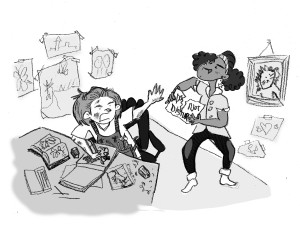|
|
July 17, 2013
 I'm not allowed to go anywhere or do anything I have a new puppy and a new appreciation for the importance of unstructured play. And of summer. Kids need a summer escape from homework, tests, and The Schedule. They need fun with friends and time spreading their wings. They need time to practice good judgement. And we need time learning to relax and let them.
I recently heard from a teen who wants to play, but he’s having trouble earning a recess pass:
Teen: I’m 14 and my parents don’t let me do anything. I only get to relax with my friends like once every 5 months. I asked to go to a theme park with my friends and my parents started freaking out and said no. They hold it against me for when I went to there last summer.
Annie: Parents don’t freak out for no reason. What happened the last time?
Teen: Nothing. I was completely safe. I didn’t do anything bad and neither did my friends. Besides my mom was there with us too. She just didn’t walk around with us.
Annie: Hmm. Sounds like you don’t know why your parents don’t want you to go to the theme park. You should ask them.
Teen: I always ask my parents nicely and very respectfully when I just want a day to relax with my friends. Even though my friends are good, my parents say no. All I ever get is school, swim practice, and go home and study. I’ve been doing that since I was 4 or 5. I talk to my parents about me growing up and I need to get out to experience life and they won’t listen to me. They say that other parents are the same, but when I ask other kids of overprotective parents, they are treated completely different.
I’m overall a good kid. They know I can make the right choices. I do my chores, do great in sports, have straight A’s, but my parents don’t give me anything in return. I guess they still don’t trust me. I’m getting very sick of being locked up in the house all day when school isn’t in session. I only ask once in awhile if I can be with my friends, but they always say no and never give me a reason why. If they told me why, maybe I would understand their thinking. Please help.
Annie: Maybe your parents are very afraid of your being out on your own. But it’s impossible to know what they’re thinking if they don’t tell you. When parents don’t help kids understand their perspective, it’s frustrating because it doesn’t give you anything to hope for or to work with. So how can you change their minds or the situation? You can’t. That’s unfair, but it is what it is.
For now, your parents make the rules. You want to earn the right to make more of your own decisions, so try negotiating with them. Say, “I want to go to ____’s house this afternoon from 1pm-3pm. We will be walking from here to there. I will call you as soon as I get there. I will call you when I leave to come home. May I please go?” If they say no, ask if you can go for one hour. Hopefully they will allow you more independence, a little at a time. If not, try to accept it and continue making good choices (you won’t be 14 forever.) If your parents give permission, make sure you follow the rules. Call when you say you will. Be home a few minutes early. In that way, they will learn to trust you and your ability to make healthy choices even when they aren’t around. That’s all parents really want, the peace of mind knowing that their kids know how to keep themselves safe. I hope this helps.
Teen: Yes. Thank you. 🙂

June 28, 2013
As I wrote in April, I’m currently working on The Girls Q&A Book on Friendship with the amazing illustrator, Erica De Chavez. We’ve been having a blast on this collaboration and that’s always a good sign about the finished product!
Easing into the looong Fourth of July weekend (Why not start celebrating now?) I thought I’d give you another sneak peek at the book, since we’ve been talking about independence and this question from a 5th grader couldn’t be more on topic.
Q: My best friend doesn’t like me doing anything on my own. But when I don’t have time to do what I love, I don’t feel like I’m really me!
A: Best friends do not need to do everything together. You are both allowed to have time away from each other. It’s cool to be able to do things on your own, like read or draw, play sports, ride your bike or just to sit and daydream. Independence is a good thing.
It sounds like your friend really doesn’t understand how important “on my own” time is to you. Maybe she doesn’t understand because it’s not the same with her or maybe you’ve just never talked about it. How about telling her? If, for example, you like to draw, you might say something like this, “Sometimes, I’d rather draw than do anything else. When I’m in one of those ‘I need to draw’ moods, I want you to let me draw without getting upset with me.”
You might also ask her what she likes to do when she’s on her own. This kind of conversation can help the two of you understand each other better and that can help the friendship become stronger.
************
Check out other sneak peeks of The Girls Q&A Book on Friendship here and here.
UPDATE October 3, 2014: The Girls Q&A Book on Friendship: 50 Ways to Fix a Friendship Without the DRAMA is now available in print and on Kindle (the ebook can be read on any device, your mobile phone, tablet, or computer with the free Kindle reader app). Visit GirlsQandA.com for an excerpt, reviews, and to order your copy.

June 24, 2013
 Flying free It’s a bit early for 4th of July, but never too early to talk about independence, especially if you’ve got tweens or teens.
In my parenting workshops I often ask moms and dads: “What did you want more of from your parents?” Answers vary, but “independence” always tops the list along with “understanding” and “patience.” If that sounds familiar then you can understand why your kids probably want the same from you. Just like us, our kids are programmed to become independent.
The moment she emerges from the dark and narrow place, the infant begins exploring, compulsively gathering knowledge she’ll use on her journey. That journey is filled with unknowns and kids are easily overwhelmed. Since they must keep moving forward (the only direction Life goes), we offer reassurance: “You’re safe with me.” “I won’t let anything hurt you.” “Don’t worry. I’m here.” And we remain vigilant. Not because the world our kids inhabit is inherently evil or dangerous. It isn’t. We watch over them because our concern for their wellbeing is programmed into the deep recesses of our mammalian brain. We celebrate when they’re happy. We commiserate when they’ve experienced loss. We fight for justice on their behalf. We do all within our power to keep away everything that is uncomfortable and unfortunate. Our kids aren’t even free to be bored!
Maybe we protect them too much.
Here’s where I make a pitch for a little old fashioned benign neglect, i.e., letting kids do things on their own with the real possibility of making mistakes and yes, even failing. Without benign neglect, 21st century kids don’t have a lot of independence to explore, get messy and mess up. Kids with over-functioning parents have trouble developing real self-esteem and self confidence. Without the freedom to experience frustration and (age-appropriate) risk-taking, tweens and teens miss major opportunities to process disappointment and build resilience.
Some questions to think about:
- What’s the difference between a parent’s natural protectiveness and over-protectiveness?
- On a 1-10 scale, how would you rate yourself as a parent? (1=I’m a totally hands-off parent, 10=I haven’t relaxed since the day my child was born!) Now ask your child to rate you. If there’s a wide discrepancy, talk about it.
- In the past year, how has your child exhibited his or her growing independence? How have you responded?
- How have you encouraged and helped your child become more independent?
- In what ways might your fears (or the fears of your partner) be an obstacle to your child’s developing independence?
As our kids move toward young adulthood, maybe we should focus less on keeping them happy and more on helping them become independent thinkers with good judgment. In order to get there, they need ongoing opportunities to fly free.
Happy Birthday, America. Here’s to independence!

May 18, 2013
 "I just want this to stop! But I don't know what to do." I originally wrote a version of this article for TakePart.com where I’ve contributed education posts. Check out the rest of my articles there.
My email from teens lessens on weekends. This may seem counter-intuitive since kids have more time to connect with friends. But school is where most of the social garbage gets dumped and spread around.
If you read your teen’s texts (I don’t recommend this unless you’ve got real cause for snooping. If not, please respect healthy boundaries.) you’ll mostly find innocuous blips of conversation. But sometimes your child’s circle of friends—and frenemies—can be intentionally cruel and toxic. That’s when parents need to be aware of what’s happening. Our job is to to help kids manage their intense emotions while teaching them appropriate ways to respond to friends who aren’t acting like friends.
Of course, many teens aren’t fans of sharing friendship issues with parents. They assume adult involvement will cause loss of computer and phone access. Or parents’ stepping in will just make things worse. Sometimes those fears are well placed, especially when adults don’t act responsibly. That’s why it’s important to know when and how to help a child who’s being harassed.
More: A Bully’s Paradise: Hidden Halls, Dark Corners and No Supervision
Here are some signs that your child may be having problems with peers. He/she:
- seems upset, anxious, or worried after reading text messages or spending time on social networking sites.
- gets defensive or clams up when you ask about school in general or about certain friendships.
- exhibits a change in appetite, sleep patterns, a dramatic dip in grades, a sudden reluctance to go to school, or a loss of interest in activities he/she previously enjoyed.
If you’ve been observing any of these signs over time, talk with your child, even if he/she insists that everything is “fine.” You know what fine looks like. If what you’re seeing doesn’t look fine, then trust your instincts—but don’t turn this into an interrogation. That will add stress and make it less likely that your child will want to talk to you.
Instead, you might begin the conversation with a straightforward observation. For example: “I’ve noticed that you seem upset whenever you come home from Emily’s house.” Then close your mouth, look into your child’s eyes with compassion, and listen. Hopefully, your calm, loving demeanor will (eventually) encourage your child to open up about what’s going on.
If other kids are targeting your child, be empathetic. Then find out what your child has already tried in an attempt to improve the situation. If he/she has not yet spoken directly to the aggressor, suggest it as an option. Teach your child to let others know that he/she deserves to be treated with respect. Tell your child that staying silent in the face of injustice rarely leads to more justice. On the other hand, when a formerly passive victim stands up for him/herself, the aggressor may realize they’ve been disrespectful. They may stop. Of course, sometimes it takes more than that.
If your child has delivered a clear message repeatedly and the harassment persists, it’s time to get the school involved. If your child wants to talk with an adult at school without your help, let him/her go for it. It’s great training for life. If your child would prefer for you to be there, then be there.
Before the meeting, check out BullyPolice.org and educate yourself on the anti-bullying legislation that exists at your state level. At the meeting, let your child take the lead when talking about his/her experience. Request to see a copy of the school district’s anti-bullying policy.
If the peer harassment persists, demand another meeting with the principal, yourself, and the parents of the child(ren) who has been harassing your child. If the principal and/or the other kids’ parents are unconcerned (“It’s just kid stuff”) or if you feel like you’re getting a runaround (“We’ll work on it”), don’t waste your breath. Go over the principal’s head to the superintendent. Name names. Be a pain. Do not allow yourself to be silenced. Do not stop the pressure until the harassment stops.
Every school has a legal and moral responsibility to make sure that all students are treated with respect at all times. When parents hold schools accountable, schools are more likely to do their job well.
 — Older Posts »
| |















